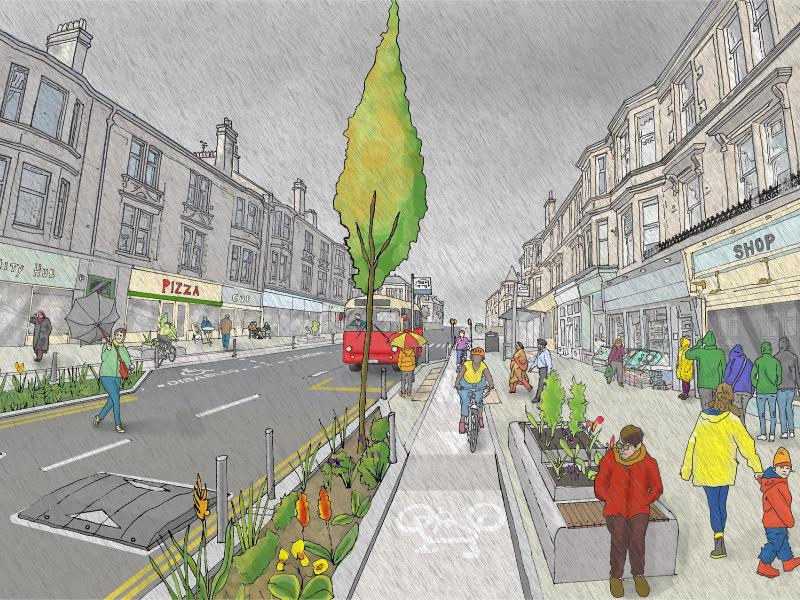Councillors meet to look at how Feminist Urbanism could transform Glasgow

In advance of International Women’s Day 2024 this Friday, a group of female councillors met with Glasgow City Council officers to discuss what Feminist Urbanism could mean for women and girls in Glasgow.
Feminist Urbanism - or Feminist Town Planning - can be described as the taking into account of women’s lived experience of the city to ensure that everyone has the place they need and that women are properly represented in decisions that are made about their environment. This can mean the physical design of public realm, including the width of footways, street lighting in parks, ensuring that city streets and open spaces are well overlooked, active and feel safe, and that local facilities are easily accessible on foot. All such improvements of course benefit everyone - but unless we listen to women we can miss opportunities to design inclusive cities.
Glasgow’s strategic plan contains a range of commitments that build upon its recent record regarding gender equity, tackling misogyny and gender-based violence amongst other commitments like creating wider economic opportunity.
The meeting focused on gender in transport and how women navigate the city, with other discussions on how to incorporate women’s lived experience and embed gender equality into the forthcoming City Development Plan.
The working group meeting was held at the offices of Mott MacDonald in the city centre, and the company have been working with the council on various initiatives and shared their experience in gender-sensitive planning in Glasgow and elsewhere.
Bailie Anne McTaggart, city convenor for Communities & Equalities who chairs the working group, said: “A number of years ago, Glasgow City Council made a commitment to resolve historical equal pay claims and to make sure that everyone is paid equally for equal work. We know however, that women still face structural barriers and ensuring equality for women in our city can go further. By looking at urban planning through a feminist lens where women are not an after-thought in the design of our public space and transport systems, we can deliver positive outcomes for everyone and generations to come where life, work, and services are better integrated.”
Future meetings of the working group will address themes such as play and play spaces within parks and open spaces. The council will also look at engagement and how this is being undertaken with women across the city in terms of consultation and involvement in development of policy and proposals.
This will build on the feminist urbanism approach pioneered in recent years by the council, for example when female council transport officers, the Maryhill Women’s Centre and other stakeholders to bring a feminist lens to active travel plans. In addition, the group will build upon the international award-winning Girls@COP26 initiative which involved 2,500 girls in developing feminist solutions with local Glasgow and global experts in place-themed and other workshops and has continued to involve the girls in the development of the future city development plan.
Lord Provost Jacqueline McLaren prioritised women’s rights by signing Glasgow up to the Carter Center’s Inform Women, Transform Lives cities campaign in 2023, to make sure women can look for and find beneficial information that enables them, their families and their communities to thrive, access public services and meaningfully participate in decision-making.
Action by Glasgow City Council has also seen it sought out by a range of different international bodies and networks - as recently demonstrated at the UNECE Forum of Mayors and UNITAR’s SDG summit, What if Women Designed the City.
This week also saw the Eurocities Taskforce on Gender Equality meeting online with representatives from the European Parliament, and the Taskforce Vice-Chair, Glasgow’s Bailie Annette Christie, joined Vienna and other cities highlighting their peer learning on gender-sensitive planning and making the case for safer cities that don’t see the ‘second sex’ as an afterthought.
Bailie McTaggart continued: “We are standing on the shoulders of many women from Mary Barbour onwards to Cathy McCormack from Cranhill who sadly died a few years ago and whilst raising three children in Easterhouse, campaigned tirelessly to improve poor housing and poor health. Feminist urbanism is nothing new, it simply means creating ‘Her City’ - the city they and so many women have striven to build over the years. A people-centred city where lives once pock-marked by a poverty of life chances are empowered and fulfil their potential.”





















